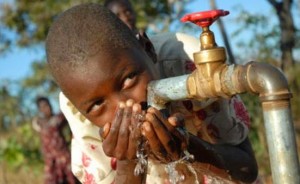WaterAid Ghana outlines global strategic plan
 WaterAid Ghana, an NGO in water and sanitation, has outlined its new global strategic plan to achieve universal Water, Sanitation and Hygiene (WASH) by 2030.
WaterAid Ghana, an NGO in water and sanitation, has outlined its new global strategic plan to achieve universal Water, Sanitation and Hygiene (WASH) by 2030.
Dr Afia Zakiya, the Country Representative of WaterAid Ghana, said the new strategy encompasses reducing inequality, strengthening sustainable services, improving hygienic behaviour, and integrating these services into sustainable development.
Speaking at the organisation’s 30th anniversary ceremony in Accra, on the theme “Celebrating Progress Towards Universal Access to Sustainable WASH Services by 2030”, Dr Zakiya said the plan would focus on district wide approach to promote decentralized Water, Sanitation and Hygiene services and improved sector collaboration and coordination.
She said WaterAid would ensure safe water at the point of use, control waste water and rainwater, care for persons who are vulnerable to infections and ensure sustainable water services through access to quality water.
Dr Zakiya noted that about 23 million people in the country lacked access to improved sanitation, while 86 per cent did not have access to sanitation.
She said WaterAid had therefore provided facilities such as mechanized boreholes, hand-dug wells, institutional latrines and hand washing facilities to districts across the country.
“WaterAid currently operates in 13 districts in six regions in the country, including the Northern regions, and it has for over 30 years, transformed the lives of over one million people in very poor communities with clean water, and over 800,000 with sanitation and hygiene education programmes,” she said.
Madam Mariame Dem, the Head of WaterAid, West Africa, said the organisation which operates in eight countries in the region, including Burkina Faso, Liberia, Mali, Niger, Nigeria and Senegal, is ready to work with governments and allied WASH institutions to have a developed Africa “where everyone everywhere lives in dignity because of improved access to safe water, sanitation and hygiene.”
Dr Mohammed Ibn Chambas, the Head of the United Nations Office for West Africa, said with climate change and increasingly unpredictable weather conditions, over two billion people had been affected by drought, and more than 11 million people had died as a consequence of drought.
He noted that one out of every five deaths of children under five, resulted from water-related disease, and only 67 per cent of the world’s population had access to sanitation.
“The role of WaterAid in facilitating international cooperation would be crucial towards encouraging water efficiency and support treatment technologies in developing countries,” he added.
Source: GNA
